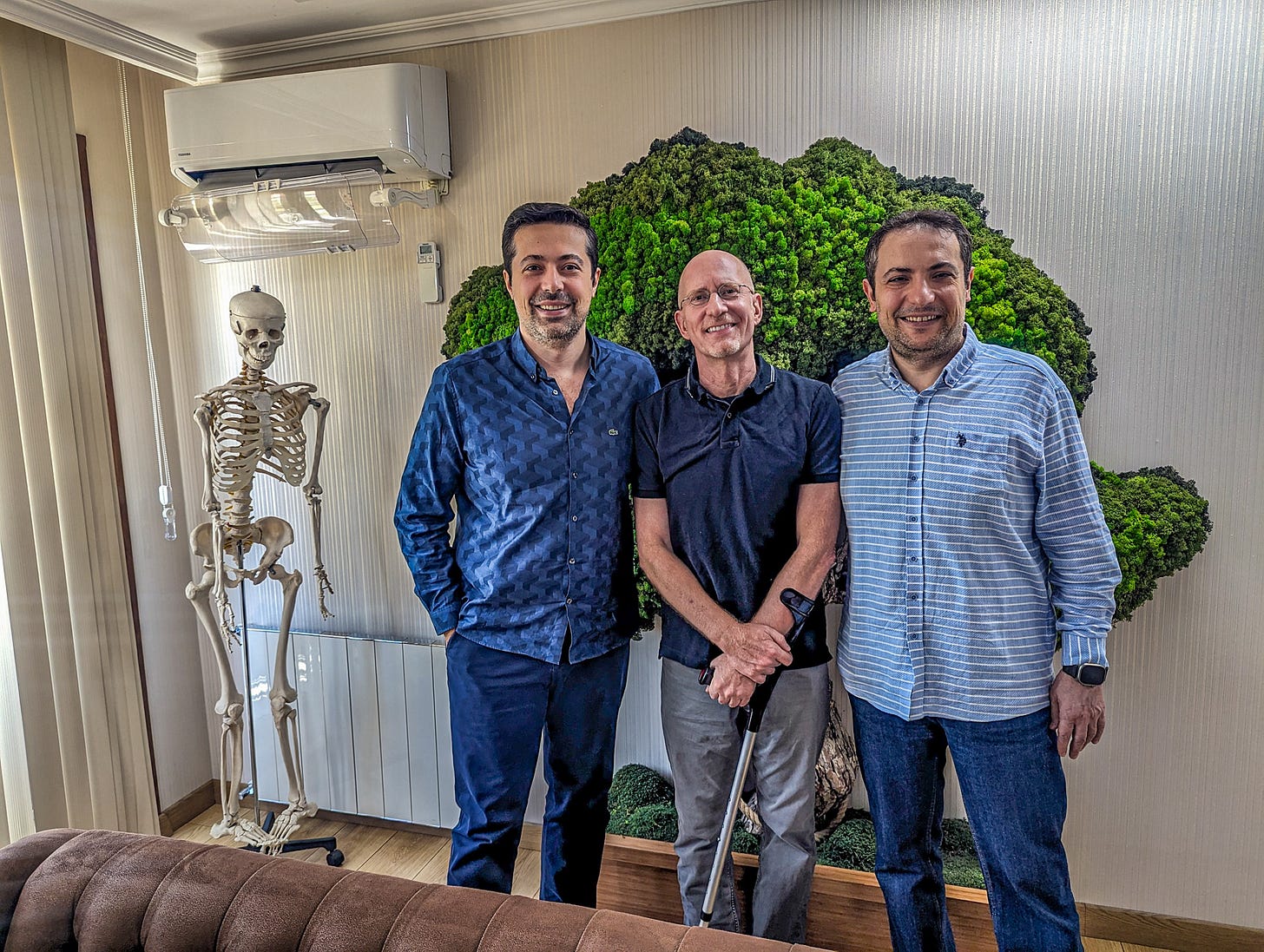The Powerful Magic in the Words "I'm His Husband"
Being able to call Brent "my husband" has opened many doors. But lately, some people want to close them again.
For the audio version of this article, read by the author, go here.

In many fantasy stories, there are things known as “Words of Power” — a simple magical word or phrase that can make amazing things happen.
In the world of Harry Potter, the words “Wingardium Leviosa!” cause objects to levitate. And in The Lord of the Rings, the word “mennon” magically unlocks a tightly sealed door.
Not everyone realizes it, but such Words of Power exist in the real world too.
Last fall, Brent was lying in a hospital bed in Tromsø, Norway, in massive pain from what turned out to be a kidney stone.
The hospital room door opened, and a doctor entered.
He introduced himself and said, “When did the pain start?”
Brent was in too much agony to speak. So I said, “About an hour and a half ago.”
The doctor looked at me and said, “And you are?”
“I’m his husband.”
“Of course,” said the doctor. “Please continue.”
Just like that, those three little words — I’m his husband — performed linguistic alchemy, transforming Brent and me — two seemingly unrelated men with no legal or societal standing — into probably the most essential bond in the world: a married couple.
Words of power, indeed.
I continued telling the doctor Brent’s symptoms, and from that moment on, my presence and legitimacy were firmly and unquestionably established to speak for the person I love and to whom I am married.
Most straight folks don’t often consider the power of these words. They’ve always had access to them, at least theoretically, so they take them for granted.
But we LGBT folks know differently.
In America, the federal right to same-sex marriage didn’t exist before the 2015 Supreme Court decision Obergefell v. Hodges, which extended the rights in the U.S. Constitution to all couples, not just heterosexual ones.
Brent and I very clearly remember when we didn’t have access to these special Words of Power. We were reminded often enough: whenever we rented a car or signed up for a gym or almost any kind of membership. As an unmarried couple, we almost always had to pay more.
We were reminded at other times too: when we filed our annual taxes, or bought a house, or considered our future Social Security benefits, or applied for health insurance.
Sometimes we could take steps to get some of the things that heterosexual married couples took for granted. We once spent hundreds of dollars having medical powers of attorney drafted so we could make medical decisions for each other in emergencies.
We resented having to pay for — and do all this extra work — to get protections that everyone else took for granted. And sometimes there was simply no way to get the same rights that straight people had.
Even more importantly, there was the emotional toll. All these things made us feel less legitimate — less “real” — than other couples.
Then the U.S. Supreme Court uttered its own special invocation, and — poof! — the words “I’m his husband” were now Words of Power for us.
We no longer had to work to convince the car rental company we were spouses.
We didn’t have to explain to strangers that, no, we’re not business partners.
Most importantly, we didn’t have to worry about being able to make critical medical decisions for each other.

As nomads, we’ve visited other countries that have few LGBT rights at all, much less marriage equality.
In Turkey, Pride celebrations have effectively been banned. In some cities, it’s illegal to discuss LGBT issues in public.
But incredibly, even in Turkey, the words “I’m his husband” still have power, at least for Americans like us.
The Turkish government might not acknowledge our marriage, but America — the most powerful nation on earth — does, and that carries serious weight.
That’s why last year, when we were in Istanbul so Brent could have foot surgery, he wrote “married” when asked about his marital status on the intake forms and listed my name under “spouse.”
Yes, there was a risk of discrimination from the hospital staff, but our doctors were on board, and we wanted to clearly and unambiguously state that I was deemed capable of making medical decisions on Brent’s behalf.
It’s also our hope that by going to Turkey — and other less LGBT-tolerant places like Bulgaria and Cambodia — we might be playing some small part in normalizing same-sex relationships and even same-sex marriage.
If nothing else, it puts our faces on the abstract issue of LGBT rights. And it puts a name to the relationship that locals might be puzzling over when they see two middle-aged men traveling and living together.
But the Words of Power have their limits, especially in more intolerant countries.
Thankfully, we’ve never invoked them and had them fail. But there have been times we decided not to use them for fear they wouldn’t work.
Once in Tbilisi, Georgia, an Uber driver started quizzing me about my relationships with women. He was clearly trying to find out if I wanted him to connect me with a female prostitute.
If I’d invoked the Words of Power, it would've stopped his questions. But Georgia is an intolerant country, and those words might also have gotten me beat up — or at least kicked out of his car.
In fantasy stories, magic often disappears over time, either because ancient powers die out or because essential rituals are neglected.
Unfortunately, that seems to be what’s happening in the United States right now.
Some people say the federal right to same-sex marriage will never disappear in the U.S. — that it’s already too popular and too widespread.
But, well, this is what they said about abortion rights too, before Roe v. Wade was overturned in 2022. And that was the law of the land for almost fifty years — not less than ten.
Since the reelection of Donald Trump, it’s clear that the right wing of the Republican Party is now firmly in charge. On cultural issues, the priorities of far-right evangelical Christians are now front and center.
On reproductive health, Republicans are already moving to ban mail delivery of abortion pills, restrict interstate travel for abortion, and maybe even use an existing law to ban abortion nationwide.
They’re also hoping to completely redefine the notion of a “separation of church and state,” and Trump is weakening or eliminating anti-discrimination laws.
And, of course, Trump has already issued a string of anti-LGBT executive orders, scrubbing government websites of, say, HIV prevention information and forbidding government agencies from even mentioning things like LGBT Pride.
Republican support for same-sex marriage is currently falling fast — from 55% in 2022 to 46% now. And at the state level, more and more Republicans are openly saying they want to eliminate marriage rights.
The Supreme Court could also very easily overturn Obergefell v. Hodges. The court is much more conservative than in 2015 when that case was decided, and any additional appointments Donald Trump makes to the court could very well make it even more conservative.
The magic is clearly weakening behind the words of power “I’m his husband,” at least in the United States. But that doesn’t mean it’s gone forever. We all know that in fantasy stories, fading magic has a way of returning — the Force “awakens,” and long-forgotten dragon eggs hatch without warning.
But in those stories, it takes brave heroes to make it happen.
That’s the way it works in the real world too.
See also…
Should You Travel to Homophobic Countries?
Just How "Out" Should Gay Travelers Be?
We’re a Gay Couple That Had to Get Married Five Times
Relationship Advice for Straight Couples from a Long-Term Gay Couple
Michael Jensen is a novelist and editor. For a newsletter with more of my photos, visit me at www.MichaelJensen.com.






Thank you for writing this post and continuing to raise the importance of marriage equality. I'm very concerned that we will lose our marriage rights. Straight people have told me that they don't think that will happen but it's so easy for them to say that. They never had to fight for the right to use the words "husband" or "wife" the same way we have. People need to see the faces of those this issue affects. We are real people who potentially could lose so many rights and benefits. And to have your marriage dissolved in an instant due to political and religious motivations? It's horrifying. We are real people with love that is real and marital commitments that are real. So again, thank you for raising this issue.
Ah, Michael, all I can say is I love your heart. I remember when gay marriage was being discussed, and I honestly never thought it would happen. I was thrilled when it became law, but even then I had my doubts. I waited for the 'loopholes', which, given the climate for gay anything, seemed to be inevitable. And there were some attempts, to be sure, but your marriage to the man you love is sacrosanct. It's binding, no matter who says otherwise.
It's a clear minority now who would object to two people in love wanting to commit to each other. We can't let them have any more power.